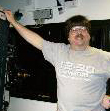|
|
This topic comprises 3 pages: 1 2 3
|
|
Author
|
Topic: Digital film revolution poised to start rolling
|
Mitchell Cope
Master Film Handler

Posts: 256
From: Overland Park, KS, United States
Registered: Jun 99
|
 posted 05-18-2005 12:10 PM
posted 05-18-2005 12:10 PM




I normally don't follow the digital stuff too much, but I thought this article was interesting. Does this measure up to reality over the next 3 years?
USA Today article - "Digital film revolution poised to start rolling"
quote:
Digital film revolution poised to start rolling
By David Lieberman, USA TODAY
NEW YORK — Director George Lucas sure has a vivid imagination.
Science-fiction fans will see one aspect of it this week at theaters showing his latest flick, Star Wars, Episode III: Revenge of the Sith, in which Lucas explains how Darth Vader got to be such a bad guy.
For the film industry, though, the movie is a reminder of what a dreamer Lucas has been about another pet project: digital cinema. A passionate advocate, Lucas predicted in 2001 that by the time Sith was released, thousands of theaters would show it using digital projectors.
The reality? Fewer than 100 of the USA's nearly 36,700 screens show images from digital projectors.
Lucas didn't anticipate how much bickering there'd be over quality and encryption standards — and particularly over who'll pay for all that slick new equipment.
Yet after years of false starts and hype, the digital revolution now is making headway in the last big bastion of analog entertainment: the movie theater.
A consortium of the seven major Hollywood studios is poised to give its final blessing to a set of digital cinema standards. That should clear the way for a host of companies to market hardware and software.
Meanwhile, several studios, banks and digital cinema equipment companies are close to deals to help finance the $3 billion transition from analog to digital.
"There are two or three serious and significant deployment plans that I believe will come together over the next couple months," says Julian Levin, 20th Century Fox executive vice president for digital cinema and non-theatrical sales and distribution. "This is the first year when all the elements are coming together."
"You could see a substantial transition (to digital) begin by the end of 2006," National Association of Theater Owners (NATO) President John Fithian says.
If they're right, it could change everything from the quality and variety of what consumers see at the local Bijou to how Hollywood does business.
"This can be as profound a change in the movie-making experience as color and sound," Titanic director James Cameron told theater owners at an industry convention in March where he and Lucas hawked digital cinema.
Among ways the digital experience differs:
• Images are consistently crisper and cleaner than on today's films. Unlike celluloid, digital pictures don't break, scratch or smudge. And each frame is more evenly lit from edge to edge: There's no bright spot in the middle.
• There'll be more 3-D films (although you'll still need special glasses). A single digital projector can beam images that trick each eye into perceiving depth. With traditional film, theaters need two prints running simultaneously on two projectors.
"We need to maintain the supremacy of the theater over the living room," says Sony Pictures Digital President Yair Landau. "You don't want to be in a position where, as people start getting high-definition televisions, they say, 'This looks as good as what we see in the theater.' "
Lucas, for one, recently said that he'll release remastered 3-D versions of all the Star Wars movies.
• As with DVDs, studios can distribute digital films with soundtracks in multiple languages. Since a movie house would not have the hassle of changing prints for each language, it theoretically could schedule a new blockbuster to play in Spanish at 5 p.m., Japanese at 7 p.m. and then go back to English at 9 p.m.
Also, each audience could see different trailers and ads. Theaters could change programming as easily as one might rearrange play lists on an iPod.
• Digital theaters can show supersized non-movie entertainment including live concerts and major sports events to fill the house in typically slow periods. They can become more attractive venues for corporate presentations, college lectures and religious services.
Champing at the digital bit
Hollywood can't wait to go digital.
Studios look forward to the day when they can slash by 75% the $1.2 billion they spend each year to make film prints and ship them in bulky metal cans to and from theaters. With digital, they transmit encrypted signals to theaters via satellite or ship a small, reusable hard drive with the film preloaded.
In addition to the cost savings, studios and theaters can respond more quickly to audience tastes. When a movie is successful, theater owners can copy the digital file and feed it to multiple projectors. With celluloid, studios must estimate in advance how many prints they'll need. They're often caught short when a movie is a surprise hit and can be overrun with copies of unexpected bombs.
Digital films also will be packed with anti-piracy technology — controlling who can show the film and identifying where unauthorized copies originated — potentially reducing the $3.5 billion that the Motion Picture Association of America estimates Hollywood lost last year to illegal copies.
"Today, there's no mechanism to prevent a film from being played in off hours" to make an illegal copy, says Ahmad Ouri, president of Thomson's Technicolor Digital Cinema.
For more protection, his company is about to roll out technology that embeds in a digital film video signals that are invisible to viewers but that jam camcorders, which pirates often sneak into theaters.
With so much going for digital, why has the transition taken so long?
In part, it's because digital cinema has operated like the Wild West, with different companies pushing rival versions of hardware and software — sometimes with images that purists consider inferior to film.
"Up to now there've been five incompatible compression formats used," Ouri says. "There's been no standard for compression (to shrink the huge size of a digital movie file) or encryption (to deter piracy)."
Standards are needed so all the projectors can show (decompress and decode) movies from any studio. Such compression and encryption standards, for example, let you play a movie DVD on any player.
Now a Hollywood consortium, called Digital Cinema Initiatives (DCI), is preparing to endorse a set of standards everyone will be expected to follow.
"DCI is within a month of completing detailed technical specifications," says Fithian. "Most of the difficult issues have been resolved."
For example, it will mandate that the number of lines of resolution in digital movies (essentially a measure of the sharpness of the images) be at least 2,000 — topping the 1,080 in high-definition TVs. It will accept a format promoted by Sony that goes to 4,000.
A tough sell
All of their work will be for naught, though, if theater owners don't install and use digital equipment.
That's been a tough sell.
"A current 35-millimeter film projector costs about $30,000 and lasts 35 years," says NATO head Fithian. "Digital costs upward of $100,000, and I doubt it will last 25 years. You're giving us something akin to the first generation of a cell phone or a laptop."
His organization took a tough negotiating stand in November. It passed a resolution insisting that all of the major studios — the companies expected to benefit most from digital — finance in some way all the costs to buy and install digital cinema equipment for any theater that wants it. In addition, theater owners want the right to decide what models of gear to take and then want to own the equipment when the financing period is up.
What's more, NATO wants studios to guarantee that they'll offer digital versions of their movies to any theater that has a digital projector.
Skittish about financing
The owners are likely to get most of what they want.
"The studios have already said in principle that they will pay" for the equipment, says Bud Mayo, CEO of Access Integrated Technologies, a publicly traded firm that offers software and services to help theaters manage digital films and programming. "But the exhibitors have to have some skin in the game," such as by agreeing to cover maintenance costs for the equipment.
Studios are skittish about discussing how the financing might be arranged. They fear that they'll be accused of antitrust violations if all of the top distributors are perceived to have collaborated on a digital plan.
As a result, several deals are under discussion.
"There is a group of studios led by Disney, Warner Bros. and Sony trying to put together a funding consortium, and we think others will join them," Fithian says.
In each case, the planners expect to create a separate entity that would borrow cash to pay for digital projectors. The entity would own the projectors and let theaters use them, free.
The entity would recoup its cash from the studios. Each would pay a fee, effectively leasing the projector each time it shows one of the studio's digital films.
Executives are eager to get the party started, beginning with a midsize to large market that would convert to digital and test equipment made to the new DCI standards.
After that, "You can get to 15,000 screens in two to three years," says H.C. Wainwright analyst Bill Relyea. "Some people think it'll be faster."
Speed of transition
Mayo, who expects the digital transition to be virtually complete by the end of 2008, is doing his part to move things along.
This month he installed digital projectors for five of the eight screens in a Brooklyn movie house he owns, a former vaudeville palace that headlined stars such as Jimmy Durante, Mae West and Abbott & Costello.
Mayo will use his theater to showcase Access Integrated's software and services. "This is a disruptive technology, and the little guys often win in that market because they're single-minded," he says.
Others are less sure about the pace of transition.
"You're talking about a seven- to eight-year rollout or possibly longer," says Levin.
Studios may not be able to invest heavily on digital projectors. Their costs will probably rise as they have to simultaneously support digital and analog.
In addition, some theater owners may wait on the expectation that digital projectors will be better built or support even higher standards in a few years.
"There's a real chicken and egg to the conversion," says Landau. "You'd like it to move faster, but if not everybody is on board, then it won't be effective."
Fithian says that it's up to the studios to decide on digital's future — and that they'd better move quickly.
"They'll either have their act together this year, or it'll fall apart," he says.
Still up in the air is whether Lucas' fantasy will succumb to the Force, or the farce.
| IP: Logged
|
|
|
|
Aaron Haney
Master Film Handler
Posts: 265
From: Cupertino, CA, USA
Registered: Jan 2001
|
 posted 05-18-2005 03:53 PM
posted 05-18-2005 03:53 PM




Been a while since I've seen one of these articles, all full of hype and promises of utopia. Not to mention mistakes, lots of them:
- Film hasn't been made of celluloid in a long time.
- Digital is more evenly lit? No, unless we're talking about something specialized like laser projection, it uses the same type of light source as film. It is subject to the same limitations and tradeoffs.
- Multiple language tracks can be done today, with DTS.
- 3D can already be done via a single projector, using film. It's done nearly every day in IMAX auditoriums, for example.
- Digital is not necessarily "crisper", unless we are talking about 4K or more of resolution. Most digital projectors in the field and in the pipeline are much lower resolution than that, some as low as 1.3K.
That article is full of nonsense.
That said, I am curious to see what the specs DCI comes up with are like. I hope they will be pushing for 4K.
| IP: Logged
|
|
|
|
|
|
|
|
|
|
|
|
|
|
|
|
|
|
Scott Norwood
Film God

Posts: 8146
From: Boston, MA. USA (1774.21 miles northeast of Dallas)
Registered: Jun 99
|
 posted 05-19-2005 01:39 PM
posted 05-19-2005 01:39 PM





The only viable "alternative content" that I could imagine would be corporate events--satellite conferences, product introductions, large-scale meetings, etc. I can see where a large company with employees spread around the world might want to have a way to communicate with them all at once in an efficient manner. In this case, I can see where it would be useful to have a large number of convenient venues for large-screen video projection. It's a limited market, but it probably does exist.
Other than that, I fully expect the whole "alternative content" thing to flop miserably, both due to "screen sharing" issues and due to the fact that no one is going to go out and pay money to watch a concert or sporting event on a big-screen TV.
If ![[dlp]](graemlins/dlp.gif) is going to succeed, however, it will have to do so on the basis of cost savings in film printing and shipping, not because of some "alternative content" pipe dream. Of course, the sticking point is that nearly all of these cost savings would benefit the film distributors, not the exhibitors who would need to install is going to succeed, however, it will have to do so on the basis of cost savings in film printing and shipping, not because of some "alternative content" pipe dream. Of course, the sticking point is that nearly all of these cost savings would benefit the film distributors, not the exhibitors who would need to install ![[dlp]](graemlins/dlp.gif) equipment. equipment.
| IP: Logged
|
|
Paul Mayer
Oh get out of it Melvin, before it pulls you under!

Posts: 3836
From: Albuquerque, NM
Registered: Feb 2000
|
 posted 05-19-2005 03:58 PM
posted 05-19-2005 03:58 PM





When I worked at Hughes Aircraft back in the day we used to rent the auditorium at Redondo Beach High School in order to have our annual "State of the Group" presentations. Even though the room sat several thousand we still had to schedule numerous "shows" and fleets of charter buses in order to accommodate the approx 18,000 employees of the Space & Communications Group. Having a local multiplex handy for such use during business hours back then would have been very useful to us. But how big is the market for such corporate events, especially nowadays? Nowadays at places like PanAmSat they just stream it and let people watch in their cubicles or in small groups in the various conference rooms.
I have to disagree with the consensus regarding sporting events. Before the NFL shut us down, the Super Bowl used to absolutely pack every big-screen hotel/casino venue in this town. Every video projectionist in town and every AV rental house within 500 miles could count on a week's worth of work and video projector rentals at the end of January. In the last couple of years it grew to include any adjoining multiplex screens just to handle the overflow. I'm sure in certain markets, events like the World Series, World Cup, NCAA Finals, NBA Playoffs, the Triple Crown, and any heavyweight title fight would do quite well, especially when marketed and hosted as a party with plenty of food and booze for people that can't get tickets to the actual event.
But maybe 'Vegas is the only place where this would work on a regular basis--legal sports betting here makes these kinds of things extremely popular. D-Cinema gear is still too expensive to justify buying it in order to do this--there just aren't enough of these events in any given market to justify the purchase. For now, event-specific rentals of HDTV-capable gear work just fine.
| IP: Logged
|
|
|
|
John Walsh
Film God

Posts: 2490
From: Connecticut, USA, Earth, Milky Way
Registered: Oct 1999
|
 posted 05-19-2005 05:20 PM
posted 05-19-2005 05:20 PM




My own feeling is digital IS on the way, and soon, maybe 2-3 years. At that time, I think it will ramp up in five years, like digital sound (in 1994 few had digital; by 1999 most had it). Like anything new, there is (and still will be) bickering and fights. But, the DCI seems to have learned from many of the previous false starts. The public wants it, the studios want it, and it seems they are resolving the financing issues. And when the hardware gets old, it will get moved to smaller/ second run theaters. I also feel alternative content will work, it just needs to get to the right price. No one is going to pay $40 for a concert, but I'd pay $15 to see U2 or the Stones rebroadcast live. This is a little like the cyan reader thing: it was put off for so long, people thought it was never going to happen.
| IP: Logged
|
|
|
|
All times are Central (GMT -6:00)
|
This topic comprises 3 pages: 1 2 3
|
Powered by Infopop Corporation
UBB.classicTM
6.3.1.2
The Film-Tech Forums are designed for various members related to the cinema industry to express their opinions, viewpoints and testimonials on various products, services and events based upon speculation, personal knowledge and factual information through use, therefore all views represented here allow no liability upon the publishers of this web site and the owners of said views assume no liability for any ill will resulting from these postings. The posts made here are for educational as well as entertainment purposes and as such anyone viewing this portion of the website must accept these views as statements of the author of that opinion
and agrees to release the authors from any and all liability.
|

 Home
Home
 Products
Products
 Store
Store
 Forum
Forum
 Warehouse
Warehouse
 Contact Us
Contact Us




 Printer-friendly view of this topic
Printer-friendly view of this topic






![[Wink]](wink.gif)

![[Razz]](tongue.gif)






![[dlp]](graemlins/dlp.gif) is going to succeed, however, it will have to do so on the basis of cost savings in film printing and shipping, not because of some "alternative content" pipe dream. Of course, the sticking point is that nearly all of these cost savings would benefit the film distributors, not the exhibitors who would need to install
is going to succeed, however, it will have to do so on the basis of cost savings in film printing and shipping, not because of some "alternative content" pipe dream. Of course, the sticking point is that nearly all of these cost savings would benefit the film distributors, not the exhibitors who would need to install 




